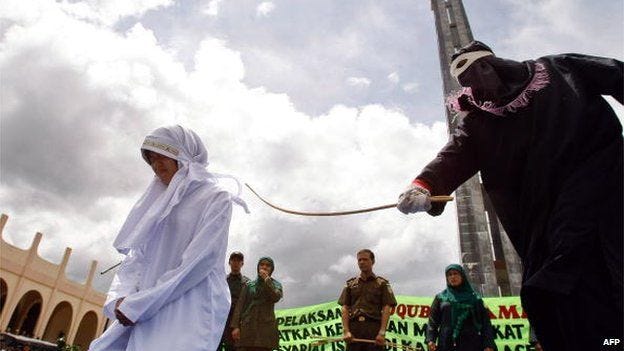We tell ourselves our system is better but we’re just as cruel.

After reading a few articles recently about some extreme acts of criminal justice, I decided I needed to write another post examining the fundamental attitudes that allow humans to feel so justified in bringing others intense suffering. The first is about a 14 year old Bangladeshi girl who was lashed to death for adultery. The next is a story from Ireland about police threating to rape some women protesters in order to intimidate them. The third is about a Pakistani girl who was gang raped as a sentence for her brothers alleged crime of having sex with someone from another clan.
Now, first of all, these kinds of things are not isolated incidents. If you pay attention to the news long enough you find story after story like this of criminal justice gone to extremes. It’s not like these are the only stories I could have used as examples.
It is my belief that every person who supports the core concepts of criminal justice are in turn supporting, and putting their stamp of approval on all of these acts of criminal justice extremism. You may not like it, in the same way the average Christian does not like the Westboro church. You might wish things like this didn’t happen, but if you support criminal justice in general, you are also supporting the extremists of that concept, in the same way that all Christians are supporting the Westboro church, even if they don’t agree with the specifics of it. The real question is, is it worth it? Do the ends justify the means? At what point does it go too far? Is this kind of extremism a reasonable sacrifice to make for the feelings of safety that criminal justice provides? I say no, it is not but even if you don’t agree with me, we owe it to ourselves to ask these questions and to try to imagine a world where we don’t need to make these trade offs.
Now the first, the girl whipped to death for adultery, most of us in America would probably argue that it would never happen where we live. Sure, we don’t incriminate people for adultery, but we do for drugs, even though it could be easily argued that adultery is worse. The people whipping the Bangladeshi girl did not really intend to kill her, and sometimes peaceful drug dealers are killed in American prisons and nobody bats an eye. The prosecutors do not specifically intend for them to be raped or killed in prison, but that’s what happens occasionally and nobody seems to care. I don’t believe we as Americans have a right to feel that our system of criminal justice is fundamentally better when we have more people per-capita in prisons than any other nation.
Even so, it’s not hard to find someone who believes criminal penalties are not stiff enough. Just start talking about a teenager who committed a murder and you’ll quickly find numerous people who believe that the kid needed more discipline. The jail should have kept him longer. His parents should have hit him harder. When we put our faith in a system like criminal justice and it fails, our natural reaction is to take our faith to the next level. What we really need to do is reexamine our faith.
Now the second story, about the police threating rape, when you think about it from the cop’s perspective it’s really no big deal. Threatening rape is one of the most common and effective things that police do. Prison rape is one of the number one things that people fear about prison, so essentially police are threatening rape to nearly everyone they encounter. I once heard a radio show where there was a member of a group trying to expose and prevent prison rape and they received numerous callers who were angry over what they were doing, saying that people in prison deserve to be raped because it’s one of the biggest deterrents to crime. So why is it suddenly wrong when a policeman directly threatens rape? It’s not much different from what they do every day. The only difference is the identity of the rapist.
The third story, on the surface, seems insane. A girl is gang raped as punishment for her brothers crime. Now, obviously sex with an outside-clan member doesn’t seem like a real crime, but neither does marijuana, so we can’t really argue that it’s ridiculous on that point.
The fact that the person punished was not the person who committed the crime also seems wacky on the surface, but in a way it’s not too far from what we already do in America. It’s often the family members of a convict who are hurt more than the convict himself. When someone is charged a fine it’s the whole family who must make sacrifices to pay it off. When a man goes to prison, it’s his mother who collapses into hysterics because she isn’t going to see her son. It’s the wife who must take a second job to pay for the kids while dad’s in prison. The criminal knew what he was getting into and had time to prepare. His family did not.
So while these three stories may seem extreme, they are not fundamentally different from the things that criminal justice is doing here in America. If we didn’t have the resources to imprison people for years, what would we do with our criminals? Can we be certain it wouldn’t involve whips and rape?
